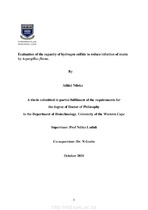Evaluation of the capacity of hydrogen sulfide to reduce infection of maize
Abstract
Maize (Zea mays L.) is grown globally as an important grain crop in South Africa, United States, China and Brazil and plays a major role in the worldwide economy. In South Africa, the grain is utilised for food consumption, livestock feed, for malting purposes and bioethanol production. Maize contains approximately 72% starch, 10% protein, 4% fat and supplying an energy density of 365 Kcal/100 g. The production of grain crops in South Africa is restricted by various factors such as abiotic and biotic stresses. The fungal genus Aspergillus is one of the most important biotic stresses affecting maize in the country. Aspergillus flavus can contaminate a wide range of agricultural commodities either in storage or field. Hydrogen sulfide appears to have a potential in the mechanism of resistance against pathogen attack by Aspergillus flavus.

